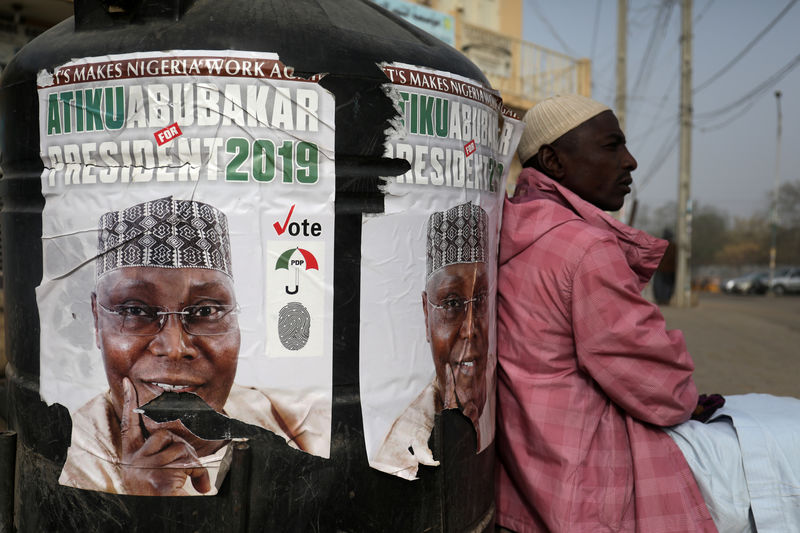By Karin Strohecker
LONDON (Reuters) - A surprise delay in Nigeria's presidential ballot has served foreign asset managers another reminder of political risk and volatile investment returns in Africa's biggest economy - just days after piling into assets in a bet on a smooth election run.
The electoral commission announced a week's delay to voting in the early hours of Saturday, citing logistical problems, even as some of Nigeria's 84 million registered voters were already making their way to polling stations.
The vote pitches President Muhammadu Buhari against former vice president Atiku Abubakar, in what is seen as a tight race.
The delay adds to uncertainty for investors, who have endured a wild ride in the West African country: The 2014 oil price crash, and election in 2015 followed by currency controls and dollar shortages that tipped the oil-exporting economy into recession in the same year, its first in more than two decades. Its bonds got ejected from key indexes.
A new exchange rate mechanism launched in 2017 drew back some investors but concern has built around the election that has proved hard to call, threatens to spark violence and promises little material change.
"The likelihood of violence is now higher than before," said Thierry Larose at Vontobel Asset Management. "And we have seen some effect on markets."
Below are four charts that show foreign investor exposure and positioning in Nigeria.
FLOWS COMING BACK
Lured by a rekindled appetite for emerging markets and an upbeat oil price outlook, foreign investors have recently raised exposure to Nigeria, according to flow tracker EPFR https://tmsnrt.rs/2BGB0Yo.
Nigeria's debt in particular has seen a sharper acceleration of inflows since the start of the year than emerging market debt more widely.
TAKING STOCK
Nigeria's debt may have got kicked out of key indexes, but its stocks escaped a similar fate. They comprised a chunky 6.4 percent in 2017 in MSCI's frontier market index of smaller and often riskier stocks.
Year-to-date, MSCI's Nigeria index has risen just over 2 percent, with an 8 percent jump in February making up for losses earlier in the year. Broader frontier and emerging equities have performed better, however.
Moreover, trading volumes have decreased steadily overall, and the percentage of foreigners trading has also shrunk to 48 percent from a peak of 65 percent in September 2017, according to stock exchange data.
Interactive - https://tmsnrt.rs/2GOrplz
"This is a deeply unloved market whether measured by overall market volumes, foreign participation, valuation relative to history, or performance versus frontier or oil-exporter peers," said Hasnain Malik at Exotix Capital. "That level of despair usually means opportunity."
EXTERNAL OUTPERFORMER
With the International Monetary Fund estimating Nigeria's debt-to-GDP ratio at just under 27 percent in its 2018 outlook, the country compares favorably to the Sub-Saharan average of 50 percent.
Nigeria's dollar-denominated debt has long been a favorite off-benchmark play. The issues have outperformed https://tmsnrt.rs/2TVAyMP both wider emerging market sovereign debt and African peers, returning some 10 percent year-to-date.
"Eurobond valuations still look attractive as yields are likely to remain anchored regardless of outcome and the election means we are unlikely to get issuance until 3Q," said Diana Amoa, emerging market debt portfolio manager at JPMorgan (NYSE:JPM) Asset Management.
Nigeria Eurobonds Outperform - https://tmsnrt.rs/2TVAyMP
LOCAL LURES
Investors are split on local debt markets. On T-bill markets, the arbitrage between high yields and stable hedging costs through currency forwards delivers solid returns for anything up to a year. The picture is less clear further out.
"We continue to like the t-bill trade as it's an attractive carry play on oil," said Kevin Daly, investment director at Aberdeen Standard Investments in London.
Others say the trade has become too crowded. And plans by presidential contender Abubakar to possibly float the naira currency makes it a risky play.
"It is like picking up pennies in front of a steam roller -you pick up a lot of pennies, but the losses are huge if the steamroller gets you," said Lutz Roehmeyer at Capitulum Asset Management.

Local government 10-year benchmark yields - https://tmsnrt.rs/2V86fCH